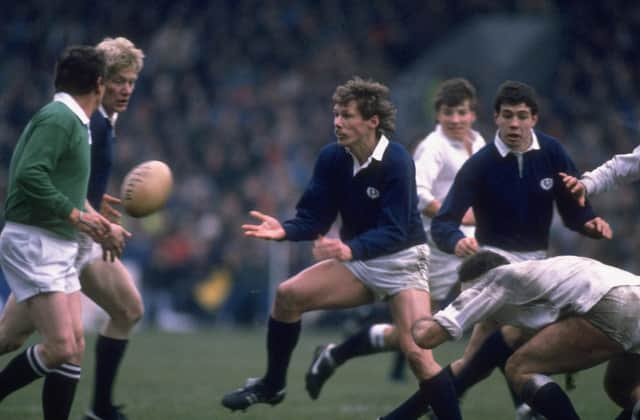Allan Massie: Scotland’s class of 1986-87 played more inventive rugby than both Grand Slam-winning teams


There will always be arguments as to which of our Grand Slam-winning teams was the better: 1984 or 1990. Perversely perhaps, one might argue that neither was the best Scotland team of the last two decades of the 20th century, and that either the 1986-87 team coached by Derrick Grant and Ian McGeechan or the 1999 one coached by Jim Telfer and John Rutherford, was better. I say “perversely” because of course the 1984 and 1990 teams did what neither of these other ones achieved, winning every match in the Five Nations .
1985 had been disappointing, the Grand Slam being followed by a whitewash. Then in the Final Trial the prospective Scotland XV lost to The Rest. So it was time for a new look. Some even suggested that John Rutherford and Roy Laidlaw might have had their day. They hadn’t and indeed played some of their best rugby in ‘86-87. Still, there was a new captain in Hawick’s Colin Deans and six new caps. The most significant of these were the brothers Gavin and Scott Hastings, David Sole at loosehead prop and Finlay Calder whose twin Jim had scored that famous try in the 1984 Grand Slam match. There was also a return for the Watsonian centre David Johnston who had missed the 1985 season on account of injury. I have always held that the centre partnership of Scott Hastings and Johnston, affectionately known in his playing days as “the Flying Ash-tray” was the best balanced Scotland have had in my time.
Advertisement
Hide AdAdvertisement
Hide AdThe first match saw France beaten 18-17. It wasn’t brilliant. All Scotland’s scores came from penalties kicked by Gavin Hastings. Defeat in Cardiff followed: 15-22, but Scotland scored three tries, none converted, to one Welsh try, and David Sole was twice denied a try which nowadays a video referee might have granted. For Wales the full-back Paul Thorburn kicked five penalties, one a monster from 70 yards out.
England then came to Murrayfield. If you happen on a video recording you can hear Bill McLaren early in the match say “England think they may have a Grand Slam side”. Long before the end it looked more like a Wooden Spoon one. Scotland scored only three tries –Matt Duncan, John Rutherford, Scott Hastings – but they were all gems. The first half was an affair of penalties. In the second Scotland ran riot to win 33-6. Never in experience, and rarely even in wildest dreams, had one seen England so thoroughly outplayed and dismantled in a Calcutta Cup match. Scotland then went to Dublin and won 10-9, Roy Laidlaw scoring what seemed like his customary Lansdowne Road try.
If there was no Grand Slam in 1986, thanks to Paul Thorburn’s mighty boot, Scotland nevertheless shared the title with France, since it wasn’t then in the event of a tie decided by points differentials.
On the face of it 1987 was disappointing after the promise and achievement of the previous year: played 2, lost 2. Yet bare results can be misleading. Ireland and Wales were beaten at Murrayfield, 16-12 and 21-15 respectively. Both were good teams, with some great players – Brendan Mullen, Phil Orr, Donal Lenihan and Nigel Carr among the Irish. Ieuan Evans, Jonathan Davies, Robert Jones and Robert Norster among the Welsh – and both beat England that season.
We lost in Paris, 22-28 and this was not only no disgrace, for France in those years were very hard to beat in Parc des Princes, but it was a defeat in a very fine match, a glorious afternoon of adventurous imaginative rugby. France scored four tries, three from the Toulouse winger, Eric Bonneval, beautifully served by the outstanding centres Philippe Sella and Denis Charvet, to our two. The second Scottish try remains vivid in memory. From a scrum just inside the French 22, Rutherford chipped over the French defence, Gavin Hastings leaped to catch and before his feet had come back to ground flicked the ball on to brother Scott who was over the line. It was one of these tries that couldn’t have been done better.
Disappointment followed as so often at Twickenham. The match should have been played in January but was postponed because of heavy snow. But it was no spring afternoon in April. Conditions were vile, wet, cold and windy. Everything, including refereeing decisions, that could go wrong went wrong, and we lost a drab game – and of course the chance of a Triple Crown – going down 12-21. The only pleasure for a Scot being a fine try scored by Keith Robertson. In truth we were overpowered that day; it was the first time we came up against the mighty Dean Richards. The weakness of that 1987 side was that we had no genuine lock forwards. Indeed the back five of our scrum – Iain Paxton, Derek White, John Jeffrey, John Beattie, Finlay Calder – all usually played at No 8 for their club.
Still 1986-87 saw Scotland play much more lovely adventurous rugby than either of our Grand Slam teams. They went on to the first World Cup, but that’s another story, as is the 1990 Five Nations campaign.
Comments
Want to join the conversation? Please or to comment on this article.